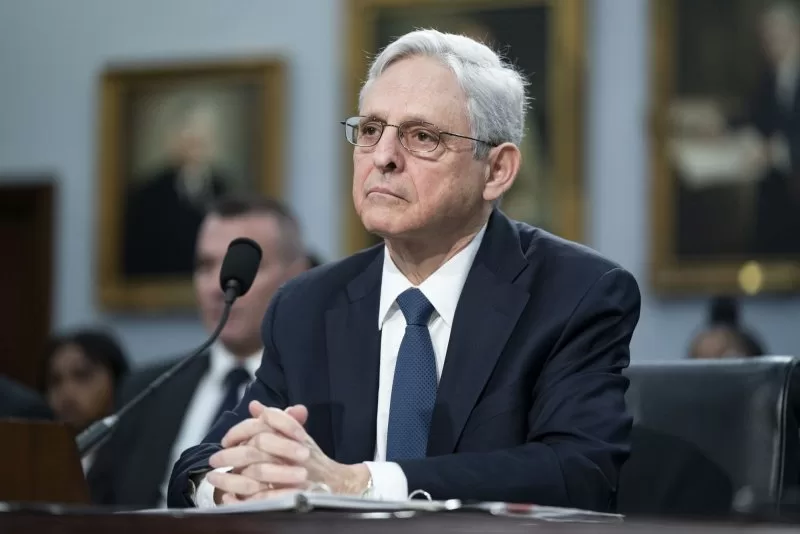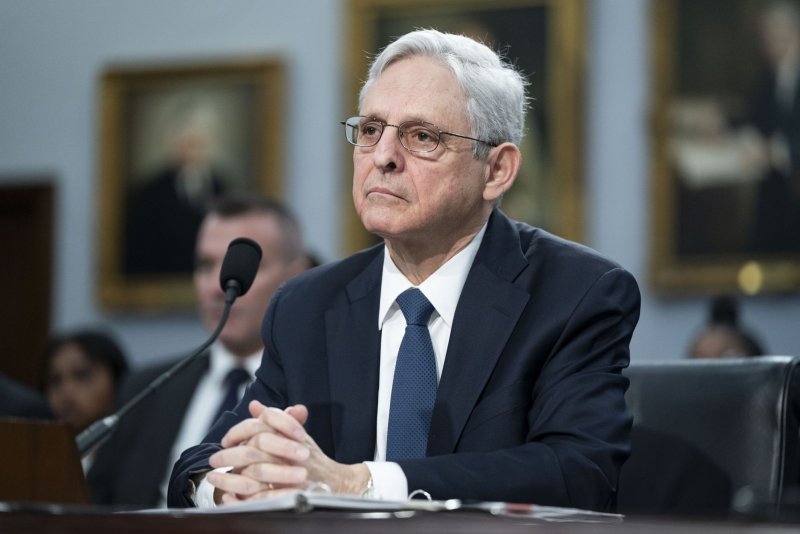1 of 2 | Attorney General Merrick Garland speaks during a House Appropriations Subcommittee on Commerce, Justice, Science, and Related Agencies hearing on the Justice Department’s fiscal year 2025 budget request at the U.S. Capitol in Washington, D.C., on April 16. File Photo by Bonnie Cash/UPI |
License PhotoJune 4 (UPI) — The Justice Department’s lawsuit against Live Nation seeks to break up one of the biggest ticket distributors in the United States in the latest swing at antitrust cases by the Biden administration.
The department filed the lawsuit in the southern district of New York last week, alleging that Live Nation is wielding monopoly power to strong arm venues and artists and maintain control over the event space. Live Nation has denied these allegations, arguing that there has never been more competition in the industry.
The lawsuit is but the latest in President Joe Biden‘s administration’s actions against potential antitrust violations. The Justice Department has active suits against Google and Apple while the Federal Trade Commission has issued complaints against Amazon and Meta — formerly Facebook Inc.
The legal theories at play in the case of Live Nation are not novel according to legal experts. It is based on sections one and two of the Sherman Act — the federal act established in 1890 to prohibit attempts at monopolization. However the scope of the case is ambitious, Douglas Melamed, visiting fellow at Stanford Law School, told UPI.
Melamed was the acting assistant attorney general when President Bill Clinton‘s administration filed a lawsuit against Microsoft, alleging it monopolized the computer software market.
“Alleging monopolization of three separate markets is a pretty ambitious type of case,” Melamed said. “It’s not obvious on the face of this how they’re going to prove this. It’s factually ambitious.”
The three markets Melamed refers to are the market on venues, ticketing and promotion. The government alleges that it has squeezed out the competition through intimidation, coercion and other means on all three fronts.
By doing so, Live Nation is able to charge customers higher prices, according to Attorney General Merrick Garland.
“It is time to break it up,” Garland said in a statement. “We allege that to sustain this dominance LiveNation relies on unlawful, anticompetitive conduct. The result is that fans pay more in fees, artists have fewer opportunities to play concerts, smaller promoters get squeezed out, and venues have fewer real choices for ticketing services.”
According to a blog post by Dan Wall, Live Nation’s executive vice president of corporate and regulatory affairs, the lawsuit will do nothing to reduce ticket prices or service fees. He also says Ticketmaster’s market share has declined since merging with Live Nation in 2010 and there is more competition than ever.
Wall notes that Ticketmaster’s service fee take rates are lower than other services like airbnb, Uber, Playstation, Twitch and competitor StubHub.
“DOJ is not helping consumers with their actual problems,” Wall writes. “This is why the government has never been less popular — because they pretend they are fixing your problems when instead they are pandering to a narrow set of political interests.”
Live Nation Ticketmaster merger
The Justice Department approved the merger of Live Nation and Ticketmaster in 2010 with a consent decree. This placed certain conditions on the merger, prohibiting what it viewed as potentially anticompetitive practices.
Ticketmaster in particular has been fraught with issues since, leading consumers to complain about difficulty purchasing tickets, long wait times and high prices.
Those issues came to a boiling point in 2022, when tickets to Taylor Swift‘s Eras Tour went on sale. Ticketmaster’s website was overwhelmed with requests for tickets leading to hours-long outages.
Many tickets were bought up only to be resold at higher prices on the secondary market, in some cases for tens of thousands of dollars.
“I believe in capitalism and to have a strong capitalist system,” Sen. Amy Klobuchar, D-Minn., said during a 2023 hearing over competition in the live entertainment industry. “You have to have competition, you can’t have too much consolidation — something that unfortunately for this country, as an ode to Taylor Swift, I will say we know ‘all too well.'”
George Hay, Charles Frank Reavis Sr. professor of law at Cornell, said the Justice Department likely regretted allowing the merger.
“They’ve been looking at this issue for quite a while,” Hay told UPI. “The Taylor Swift thing sort of highlighted it. The Department of Justice is regretting that they allowed that merger to go through. People have been complaining about that for a while.”
Hay looks back at the United States vs. AT&T Inc. case in 1982 as one that rings similarly to the Live Nation lawsuit. AT&T was alleged to have a monopoly over local phone service. The government ordered it to divest its control of the Bell Operating Companies to break the monopoly up.
“They used to make sure competitors like MCI couldn’t hook up to local markets,” Hay said. “The remedy was to separate long distance from local markets.”
Similarly the Justice Department seeks to break off Live Nation’s ticketing service, Ticketmaster, from the rest of the company.
Biden administration vs. monopolies
The Biden administration has been more aggressive than most in confronting antitrust complaints, according to Hay. Typically democratic administrations are, he said, but with cases against Google, Meta, Apple, Amazon and now Live Nation, the Biden administration could usher in monumental change in the digital arena.
So far, none of the cases have established a new precedent however.
“These are hard cases. These cases didn’t come out in the first week of the administration,” Hay said. “They all took time to build.”
Monopolies like those alleged to be built by companies like Google, Meta, Apple and Amazon are referred to as platform monopolies. They differ from the classic brick-and-mortar monopolies of the past like AT&T in their reach, and to the concern of the government, their potential for longevity.
“IBM had a monopoly over computing in 1969. People thought that monopoly would go on forever but who is thinking of IBM that way today?” Hay said. “There’s concern today that these platform monopolies are more enduring than other monopolies, therefore the government has to do something or they’re going to continue.”
Google, for instance, is accused of monopolizing the digital advertising space through its search engine. The Justice Department alleges it gives preference to certain advertisers in its search, effectively tipping the competitive scale in far-reaching ways.
Consumers have meanwhile adopted these platforms widely and made them an ever-present part of their daily lives. While they dominate their respective markets, they also have their own ecosystems that stretch their presence even further.
While the Biden administration has taken on tech platforms aggressively, it has also focused on deterring mergers, Melamed said.
“They created a new, aggressive set of merger guidelines. They have been very aggressive trying to prevent and deter mergers,” he said. “The deter thing is something where the FTC has been more aggressive. The Justice Department changed a lot of rules and procedures. The effect of the premerger review is much more burdensome to merging parties.”
A president’s role
It will be a year at minimum before the case against Live Nation goes to trial. By that time there could be a new administration. Melamed said that could impact these cases.
When President Ronald Reagan came into office there were two significant antitrust cases outstanding. One was the case against AT&T. The government reached what Melamed said was a “favorable settlement” in that case.
The other case was the case filed against IBM more than a decade earlier. That lawsuit was dropped after 13 years.
Melamed said two more options exist in the case that former President Donald Trump is elected: continuing the cases or settling on terms that are more favorable to the defendants.
“Antitrust law, at least since the ’70s and ’80s, has been something of a technocratic area of the law where there’s wide consensus. If the agencies bring a case, usually their successors will respect the seriousness of the case and will continue it,” Melamed said.
“A Trump administration is not as likely to say we have to respect the staff. They are more likely to show contempt for them because that’s their style. The most likely thing other than dropping the cases would be to settle them and probably on terms that are reasonably favorable to the defendant.”
If the Live Nation case does move forward, regardless of who is in office, Hay expects it to be a bench trial.
“Most civil cases by the government are bench trials. That makes it go quicker,” Hay said. “The government has been trying to get a jury trial against Amazon by claiming damages. I’m not sure they’ve done that here.”
“It’s always open to the government and Live Nation to settle the case if Live Nation is to promise to stop doing certain things,” he continued. “The government pretty clearly wants Ticketmaster spun off. Live Nation is not going to agree to that. Live Nation has made promises in the past and the government claims they reneged on those promises.”

